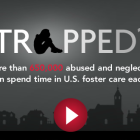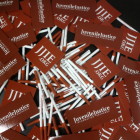Students Sound Off on Georgia Campus Carry Bill
|
JJIE intern Claire Bohrer experimented with Instagram and Facebook videos.
Juvenile Justice Information Exchange (https://jjie.org/tag/facebook/)
JJIE intern Claire Bohrer experimented with Instagram and Facebook videos.

CINCINNATI - Marian Wright Edelman sees this as a “do or die” moment for American democracy. The first black woman to join the Mississippi bar, Edelman led the NAACP’s legal defense fund in Jackson in the 1960s. She’s seen her share of social injustice. But rising incarceration, poverty and social disparity in the United States is increasingly harming children and poor people, she says – the country’s most vulnerable groups -- while special interests and money control the political system. It’s time for citizens to roll up their sleeves, she says.

For the first time, Facebook is considering allowing children under 13 to join the social networking site, according to a story in The Wall Street Journal. But a study last year by the Pew Internet & American Life Project found Facebook is already full of children younger than 13. According to the report, 46 percent of 12-year-olds are already using Facebook despite the prohibition, either with their parents’ permission or by lying about their age. The Wall Street Journal reports Facebook is researching policies and new technologies that will keep young children safe while using the page. Possibilities include giving parents control over their child’s account by linking the parent and child accounts together.

Each year, more than half a million children come into contact with the foster care system in the United States. Of those, 80 percent suffer from severe emotional problems, according to a report by the American Academy of Pediatrics. Less than 50 percent receive their high school diploma, and far fewer go into any type of post-secondary education. Those are some of the statistics, but what’s it’s like to walk in their shoes? What’s it like to face the tough challenges and choices these young men and women deal with on a daily basis?

SURVERY: About a quarter of college scholarship providers screen applicants via search and social media.
Millions of young kids are already on Facebook, even though the site can’t legally allow anyone under 13 to create a profile. And if the previous statement were a status update, Facebook would “like” it. The popular social networking wants all youngsters to be allowed; this way they can begin sharing early. Consider this: When anyone shares on the site, Facebook benefits by allowing marketers to use the data and it makes money. Giving all kids the right to sign up would insure the site’s continued dominance.

Want to interact with your favorite alcohol companies on Facebook? Then you better be able to legally take a drink. Starting September 30, alcohol companies in the United States and Europe now have to consider a set of self-regulatory guidelines designed to prevent marketing their products to kids, according to The Wall Street Journal. The Distilled Spirits Council of the United States (DISCUS) issued these rules for advertising and marketing on all branded digital marketing communications, including social networking sites, websites, blogs, mobile communications and other applications. Alcohol marketers already use age gates on their brand websites, requiring people to enter their birth date to prevent minors from accessing the sites.

Spending time on social media sites, such as Facebook, can help students do better in school, according to new research by an education professor at University of Maryland. In a survey of 600 low-income high school students, Christine Greenhow found that students build bonds when they connect with school friends on social networking sites.

Teens who spend time on social networking sites such as Facebook are more likely to smoke, drink alcohol or use drugs, says a new survey by the National Center on Addiction and Substance Abuse (CASA). The report says:
Compared to teens who do not spend time on a social networking site in a typical day, teens who do are:
Five times likelier to have used tobacco (10 percent vs. 2 percent);
Three times likelier to have used alcohol (26 percent vs. 9 percent);
Twice as likely to have used marijuana (13 percent vs. 7 percent).

Our digital communication team announced it will run a six-week contest on our Facebook page with a chance to win a $100 gift card and a JJIE VIP Swag Pack. The contest began Aug. 11, 2011 and will continue until Sept.14, 2011. Entering is really simple. Just “like” the Juvenile Justice Information Exchange page (http://www.facebook.com/JJIEga,) answer one question (which is not required), and then tune in to the Ishto see if you won.We've seen a lot of growth over on Facebook, and we'd like you to join that community.